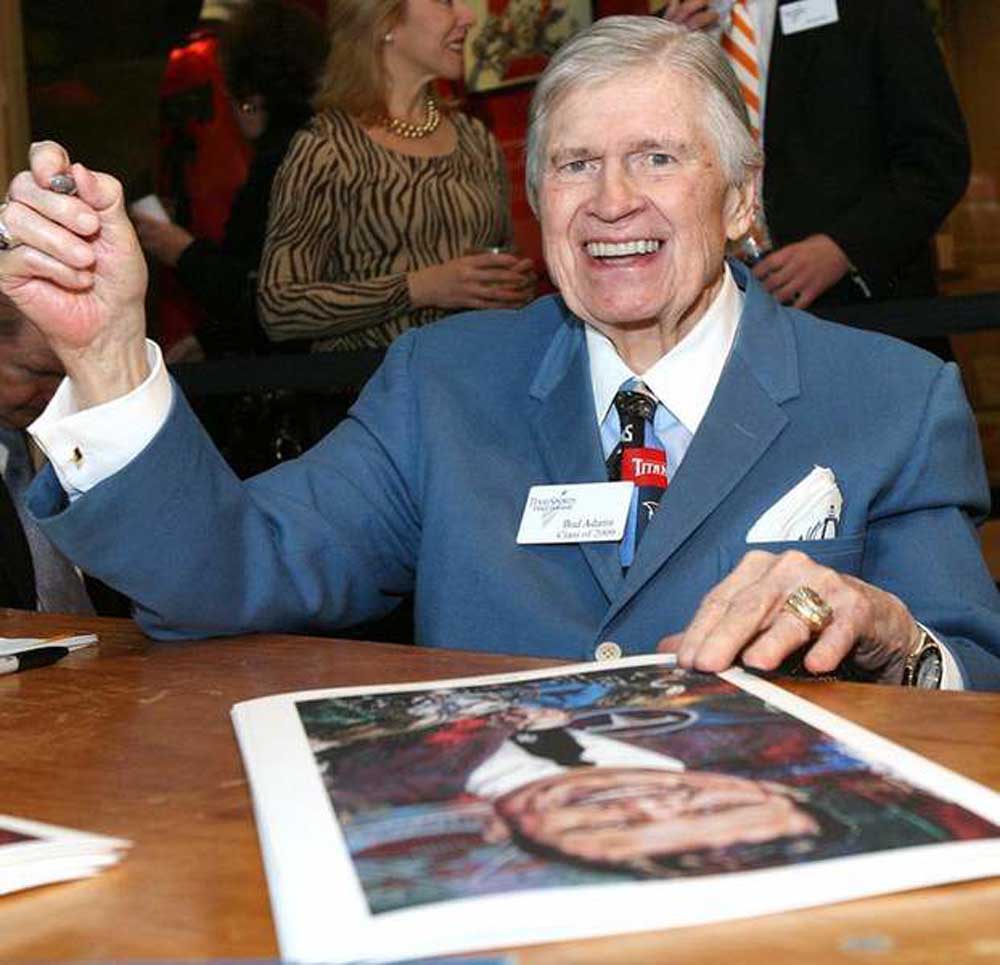Bud Adams, AFL founder, owned Oilers, then Titans
Published 5:00 am Tuesday, October 22, 2013

- Tennessee Titans and former Houston Oilers owner K.S. “Bud” Adams Jr., signs autographs during 2010 Texas Sports Hall of Fame induction activities in Waco, Texas. Adams has died in his Houston home at the age of 90.
Bud Adams, a pro football presence for more than half a century as a founder of the American Football League and the owner of the Houston Oilers, which later became the Tennessee Titans, died Monday at his home in Houston. He was 90.
His death was announced by the Titans.
Trending
The history of the AFL began in 1959 with two very rich Texans. Lamar Hunt, the Dallas-based son of oil tycoon H.L. Hunt, conceived the idea for a league that would compete with the long-established National Football League. He enlisted Adams, the owner of the Ada Oil Co. of Houston and son of Phillips Petroleum’s chairman, to join him.
They announced plans to create the AFL at a news conference in Adams’ board room, then teamed with six other founding owners in what became known as the Foolish Club, the collective name embodying the formidable task of taking on the NFL.
The new league, which began play in 1960, endured rocky financial times at the outset, but it eventually thrived and merged with the NFL in 1970. Adams’ death leaves Ralph Wilson, the founder of the Buffalo Bills, as the last NFL owner whose football roots go back to the AFL’s creation.
Adams, who like Hunt had been rebuffed in efforts to buy the NFL’s Chicago Cardinals before forming the AFL, obtained his Houston franchise for the league’s inaugural fee of $25,000. Forbes magazine estimated the value of the Titans at $964 million in 2011.
The Oilers won the first two AFL championships, in 1960 and 1961, then lost to Hunt’s Dallas Texans (the predecessor of the NFL’s Kansas City Chiefs) in the 1962 championship game.
But by the late 1980s, Adams was complaining that the Oilers’ home, the Astrodome, was outmoded, and he considered moving the team to Jacksonville, Fla. The Astrodome’s seating capacity was expanded with financing from a public bond issue, but he remained unhappy. After failing to obtain public financing for a downtown stadium, he moved the Oilers to Tennessee in 1997.
Trending
After one year at the Liberty Bowl in Memphis and another at Vanderbilt Stadium in Nashville, the team moved into a new, publicly financed stadium in Nashville, now called LP Field. (The naming rights belong to Louisiana-Pacific, a manufacturer of building materials based in Nashville.)
In their first season there, the Titans defeated the Buffalo Bills in a wild-card playoff game, scoring a final-seconds touchdown on a spectacular kickoff return spiced by a lateral – what became known as the Music City Miracle. They went to the 2000 Super Bowl, losing to the St. Louis Rams, 26-19, after getting to the Rams’ 1-yard line as time ran out.
Adams was largely a private man, uncomfortable with public-relations gestures, and he displayed a rough edge at times. In April 1966, after Al Davis was introduced as the new AFL commissioner at a Houston hotel, Adams got into a fight with Jack Gallagher, a sports columnist for The Houston Post who had criticized Oilers management.
“I called him a couple of names, then he said something back to me,” Adams was quoted as saying by Jeff Miller in “Going Long” (2003), an oral history of the AFL. “I had enough by then, so I just went over and cold-cocked him.”
Soon the two men were rolling on the floor.
“Bud was a big, strong guy,” Wilson, the Bills’ owner, recalled. “He was pummeling him. I was on top of Bud, and Al Davis was on top of me. We finally broke it up.”
Kenneth Stanley Adams Jr. was born on Jan. 3, 1923, in Bartlesville, Okla., where his father ran Phillips Petroleum.
He played in the backfield for the University of Kansas before entering the Navy during World War II, then settled in Houston in 1946 and founded Ada Oil.
Adams’ early Houston Oilers, wearing the logo of an oil derrick on their helmets and led by the former Chicago Bears quarterback George Blanda and the Heisman Trophy-winning halfback Billy Cannon, were the AFL’s premier team.
He ran the Oilers and his other businesses from an office where he displayed a vast collection of Western and American Indian art. He was a member of the Cherokee Nation as a tribal descendant through his mother, Blanche.
He changed coaches frequently while in Houston – he fired Bum Phillips after the 1980 season although Phillips (who died last week) had coached three consecutive playoff teams – but found stability with the hiring in 1994 of Jeff Fisher, who stayed on for 17 seasons.
Adams never got back to the Super Bowl after the 2000 game, but he was in the public eye in November 2009. He was fined $250,000 by the NFL for making obscene gestures at Bills fans while gloating over a home-field trouncing of Buffalo.
The Titans finished third in their division that year with an 8-8 record. The team has not finished higher than second since then. Their 2012 season included a 51-20 loss to the Chicago Bears, which Adams called the worst game in the franchise’s history.
At the time of Adams’ death, the Titans were 3-4 this year.
Adams continued to live in Houston after moving his team to Tennessee. He was chairman of Adams Resources and Energy, an oil and natural gas production and marketing company that grew out of Ada Oil. He also had holdings in Texas ranchland, California vegetable farms, real estate and auto dealerships.
His wife, Nancy, died in 2009. His survivors include two daughters, Susie Smith and Amy Strunk; and seven grandchildren. His son, Kenneth III, died in 1987 of a self-inflicted gunshot wound.
In looking back on his football years in Houston and their sour ending, Adams acknowledged that he could have done a better job of relating to the public.
“I’ve done a lot of things with the community, but I really have not been one to get out and be recognized publicly,” he told The Commercial Appeal of Memphis in 1997.
In 1996, when the Oilers were on the verge of moving, Bob Lanier, the mayor of Houston, described Adams to The Houston Press, a weekly newspaper, as “a man not given to small talk.”
“His image is of Genghis Khan and Attila the Hun,” Lanier said. “But he is not puffed up or proud.”








